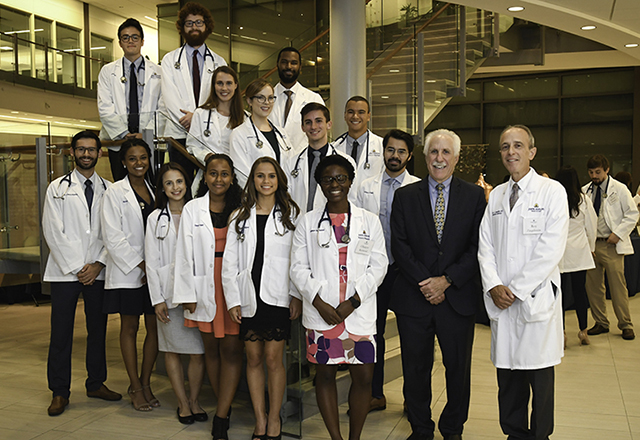United Kingdom medical school scholarships for international students
UK medical school scholarships are available to international students who wish to pursue their doctorate in the United Kingdom.
You must be able to meet the academic standards set by UK universities, show that you have adequate financial support, and be proficient in the English language (or Welsh or Scottish Gaelic).

The UK medical schools offer scholarships to international students, but there are many more throughout the United Kingdom as well as in Scotland and Northern Ireland that also provide such awards.
What do you get?
Most scholarship programs offer non-tuition awards, which means they will cover expenses that are not included in your tuition.
If you can’t cover your living costs with a scholarship, make sure to apply for other financial aid programs, as well.
Some med schools provide additional funding that helps pay tuition, rent, and living expenses during school.
Contact individual schools to learn more about financial aid or search through external organizations like Scholarship Search or Merit Aid Advisors.
Don’t have time to sift through thousands of applications? Take advantage of merit-based (or talent-based) programs where you don’t have to apply; instead, simply contact one of these organizations and ask if they have an available scholarship program.
Funding Your Study in The UK
There are a number of ways you can fund your study in The UK, including a scholarship or loan from either your government or individual universities.
For example, government-funded programs include Commonwealth Scholarships and British Council Scholarships, which cover full tuition fees and maintenance costs at many of Britain’s top institutions.
University-specific schemes provide funding to help pay tuition fees as well as other maintenance costs; they are also worth applying for if you’re interested in studying at any one particular university.
In addition to state-funded options, there are also privately funded grants available through both non-governmental organizations (such as The Prince’s Trust) and charities.
Applying for Financial Support
Although it’s no secret that studying medicine is a costly undertaking, UK medical schools may offer financial aid in the form of scholarships, loans, and grants.
Many medical schools in England even have their own scholarship programs. And depending on your country of origin, you may be eligible to apply for a country-specific grant or a bursary or loan from your national embassy.
The British Council also offers information about scholarships available to non-UK citizens. And, of course, financial aid isn’t limited to your medical studies—most universities have their own set of financial awards and funding opportunities that you can apply for during your undergraduate years.
But it’s best not to delay applying! Even if you haven’t made your final college decision yet, it pays to get started on your scholarship applications early; some programs have deadlines as early as September!
Taking the MCAT
Taking an entirely computer-based exam can be a challenge, but as most people taking it will say: it wasn’t that bad.
The toughest part of taking a computer-based test is getting over your fear of technology. Once you do that, however, all you have to do is familiarize yourself with your testing center and make sure you show up on time.
Trust us, there are enough things to freak out about during a big test—worrying about an unfamiliar computer isn’t one of them.
Choosing a Program
There are two main types of medicine programs available: a five-year course and a six-year course.
The biggest difference between these is that students on a five-year program graduate with both an MBBS (Bachelor of Medicine, Bachelor of Surgery) and a Masters degree in either science or clinical practice.
Six-year programs award only an MBBS qualification. International students applying to study medicine in England should take into account other key differences such as: where your learning will take place; how much you’ll be taught by university lecturers versus NHS doctors; and if you can expect high levels of clinical contact time at the undergraduate level.
Most importantly, it’s important to determine whether your chosen program will suit your personal interests and needs—your career prospects after graduation depend on it!
Considerations When Choosing a Place to Study Medicine in the UK
If you’re an international student interested in studying medicine, there are several things to consider before applying to a UK medical program.
One factor is tuition fees—the UK has one of the highest tuition costs among developed countries, which can increase your total cost of study.
Another major consideration is living expenses; because many UK schools are located in large cities, living costs may be higher than those in other countries.
If you need help paying for school, you should apply for a scholarship or financial aid from your institution. Scholarships and financial aid can reduce both your tuition costs and living expenses; however, it’s important to plan ahead when looking into funding options so that you don’t have to worry about money once classes start.
How Much Does it Cost?
Which brings us to the giant question, How much does it really cost to study medicine in the UK? The answer depends on where you’re from and where you choose to study.
Generally speaking, tuition at a reputable British university costs around £9000 ($14000) per year—cheaper than most U.S.
Tuition and living expenses vary between universities and student residences, so it’s important to check out some different options.
The best place to start is with your preferred university’s website—most have a section that provides detailed information about costs, admissions requirements, application forms, and links to other resources.
They can also give you an idea of how much money you’ll need each year by providing estimated figures for tuition fees, accommodation costs (dormitory or private), and living expenses.
Final Thoughts
Grants and fellowships are a great way to pay for tuition without racking up student loans. There are many grants that you can apply for, such as Fulbright Scholarships, Udall Scholarships, McArthur Fellowships, and more.
so guys I hope this was helpful. If you have any questions you can feel free to leave us a message in the comment section.
PEOPLE ALSO READ: Facebook Private Friends List




